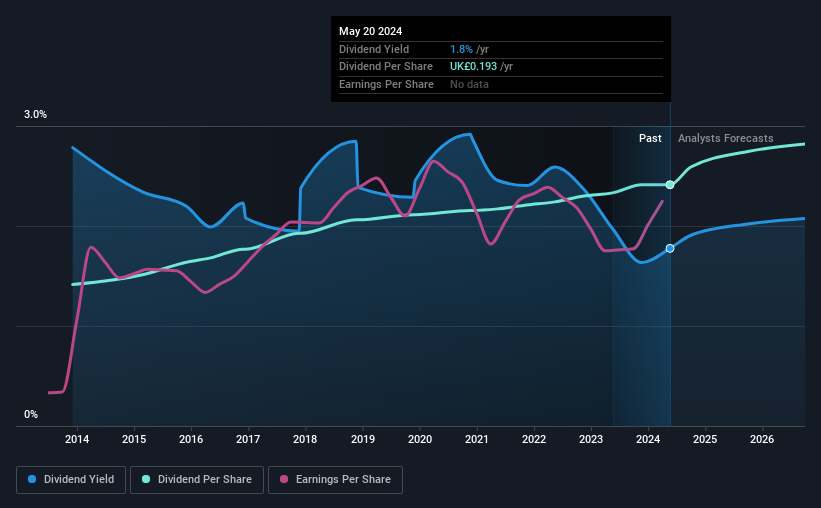Sage Group's (LON:SGE) Dividend Will Be £0.0695
The board of The Sage Group plc (LON:SGE) has announced that it will pay a dividend of £0.0695 per share on the 28th of June. This makes the dividend yield about the same as the industry average at 1.8%.
View our latest analysis for Sage Group
Sage Group's Dividend Is Well Covered By Earnings
We aren't too impressed by dividend yields unless they can be sustained over time. Before this announcement, Sage Group was paying out 75% of earnings, but a comparatively small 49% of free cash flows. This leaves plenty of cash for reinvestment into the business.
The next year is set to see EPS grow by 68.1%. If the dividend continues along recent trends, we estimate the payout ratio will be 46%, which would make us comfortable with the sustainability of the dividend, despite the levels currently being quite high.
Sage Group Has A Solid Track Record
The company has a sustained record of paying dividends with very little fluctuation. The annual payment during the last 10 years was £0.113 in 2014, and the most recent fiscal year payment was £0.193. This implies that the company grew its distributions at a yearly rate of about 5.5% over that duration. Dividends have grown at a reasonable rate over this period, and without any major cuts in the payment over time, we think this is an attractive combination as it provides a nice boost to shareholder returns.
The Dividend's Growth Prospects Are Limited
Some investors will be chomping at the bit to buy some of the company's stock based on its dividend history. Unfortunately things aren't as good as they seem. Although it's important to note that Sage Group's earnings per share has basically not grown from where it was five years ago, which could erode the purchasing power of the dividend over time.
Our Thoughts On Sage Group's Dividend
Overall, we always like to see the dividend being raised, but we don't think Sage Group will make a great income stock. The company is generating plenty of cash, but we still think the dividend is a bit high for comfort. We don't think Sage Group is a great stock to add to your portfolio if income is your focus.
Market movements attest to how highly valued a consistent dividend policy is compared to one which is more unpredictable. Meanwhile, despite the importance of dividend payments, they are not the only factors our readers should know when assessing a company. For instance, we've picked out 1 warning sign for Sage Group that investors should take into consideration. Looking for more high-yielding dividend ideas? Try our collection of strong dividend payers.
Have feedback on this article? Concerned about the content? Get in touch with us directly. Alternatively, email editorial-team (at) simplywallst.com.
This article by Simply Wall St is general in nature. We provide commentary based on historical data and analyst forecasts only using an unbiased methodology and our articles are not intended to be financial advice. It does not constitute a recommendation to buy or sell any stock, and does not take account of your objectives, or your financial situation. We aim to bring you long-term focused analysis driven by fundamental data. Note that our analysis may not factor in the latest price-sensitive company announcements or qualitative material. Simply Wall St has no position in any stocks mentioned.

 Yahoo Finance
Yahoo Finance 
